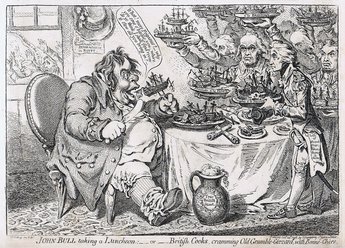John Bull Taking a Luncheon, or British Cooks Cramming old Grumble-gizzard, with Bonne-chére.
Only £265.00
Size 36cm x 26cm
Originally published by Hannah Humphrey etched by James Gillray from 'The Genuine Works of James Gillray, engraved by himself. Thomas McLean edition on heavy rag-paper from the original copper plates printed 1830.
This is the third of a flurry of prints that Gillray published in the wake of Horatio Nelson's resounding victory over the French fleet at the Battle of the Nile. It shows John Bull, the now thoroughly established symbol of a typical Englishman, enjoying a decidedly French-accented feast (bonne chére ) served up by a distinguished group of British admirals at the expense of France and her allies. It includes "Soup and Bouilli[e]" from which the portly John is already eating, "Dutch Cheese a la [Adam] Duncan," a "Fricando a la [Richard] Howe," a "Fricasee a la [Horatio] Nelson," "Desert (sic) a la [John Borlase] Warren}," and assorted other dishes presented by Admirals [Alan] Gardner, [Alexander Hood, Viscount] Bridport, and [John Jervis, 1st Earl of St.] Vincent.
The dishes and their cooks are all allusions to major British victories during the course of the now five year war against France. The Dutch cheese course served by Duncan, for instance, refers to Duncan's victory over the Dutch fleet off Camperdown (north of Haarlem) on 11 October 1797. The "Fricando a la Howe recalls Howe's role during the Nootka crisis with Spain and the major victory against France at the "Glorious First of June" in 1794. Nelson's "fricasee" obviously refers to his recent triumph at the Battle of the Nile. "Desert a la Warren" had only just been served a few weeks earlier on October 12, 1798 when Warren's squadron had successfully intercepted a French fleet of 5000 men on a mission to invade Ireland.
As the British Museum commentary suggests, the feasting metaphor in the print may have been inspired by an article in the form of a purported recipe from Nelson's New Art of Cookery that appeared in The Evening Mail (March 17 - 20, 1797).* It celebrated Nelson's daring (yet successful) departure from his orders during the Battle of Cape St Vincent. (Olla Podrida is a spicy Spanish stew.)
Commodore Nelson's Receipt to make an Olla Podrida. Take a Spanish first-rate, and an 80-gun ship, and after well battering and basting them for an hour, keep throwing in your force balls, and be sure to let them be well seasoned. Your fire must never slacken for a single moment, but must be kept up as brisk as possible during the whole time. So soon, as you perceive your Spaniards to be well stewed and blendedtogether, you must then throw your own ship on board of the two-decker. Lash your sprit sail yard to her mizzen-mast; then jump into her quarter's gallery, sword in hand, and let the rest of your boarders follow as they can. The moment you.'appear on the 80 gun ship's quarter deck, the Spaniards will all throw down their arms and fly; you will then have only to take a hop, step, and a jump, from your stepping-stone, and you will find yourself in the middle of the first-rate's quarter deck, with all the Spaniards at your feet. Your Olla Podrida may now be considered as completely dished, and fit to be set before his MAJESTY.
Nelson's New Art of Cookery.
All the "dishes" in the print include French ships, reflecting the fact that capturing ships was ultimately better than sinking them. For not only could the weapons and cargo be seized, the ships themselves could be sold to private businesses or re-used in the war effort.
John Bull is described as a "Grumble-Gizzard," that is, a habitual complainer, protesting against yet another dish of French defeat. But his more than ample girth and his enthusiasm for another bite suggest an appetite for celebrating British victories that Gillray could probably understand as he served up print after print to a seemingly insatiable audience.
The only parts of the Gillray's audience who had had enough of Nelson's victory were the Whigs, (represented by Charles James Fox and R.B Sheridan), who are shown fleeing from John Bull and who had become deeply suspect after Arthur O'Connor's recent confession of collusion with the French. (www.james-gillray.org)
 View Account
View Account
